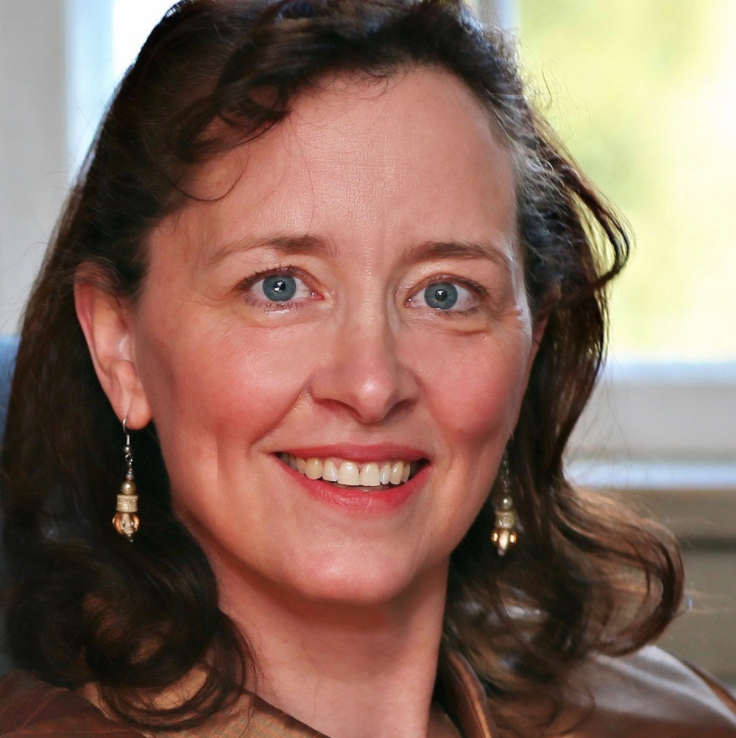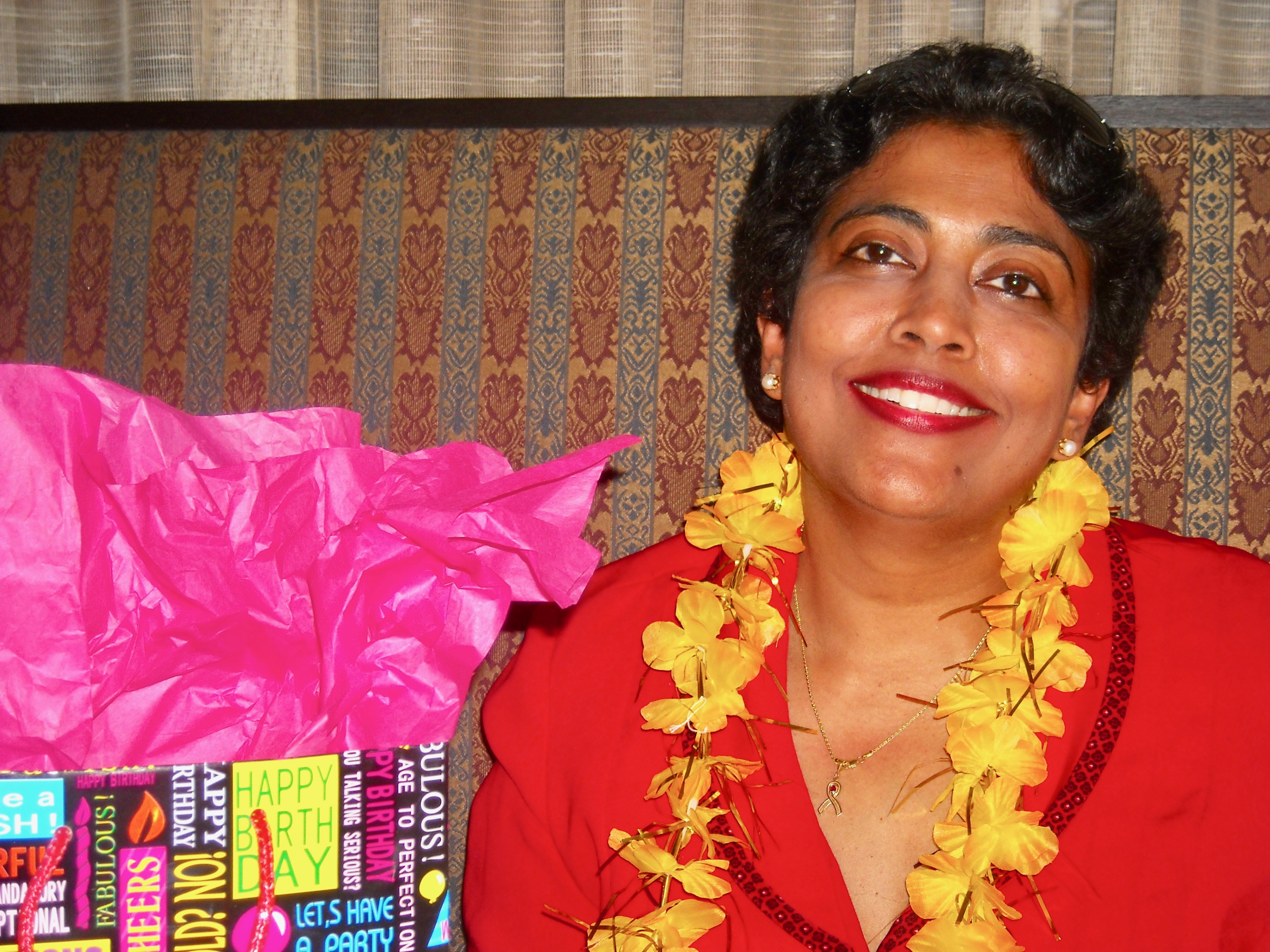I met Rajeshwari Bai Williams, an Indian immigrant to this country, over twenty years ago. She became like a sister to me — giving me the gifts of a deep sororal love.
So when she died in a hospital bed this week after surgeons tried a third time to remove a glioma tumor that had grown back at her brain stem, I was psychologically unmoored.
Rajeshwari – “Raj” for short — had a supersized personality. At times it seemed to have no bounds, like a huge wave rushing over and through and beyond everything it encountered.
It was so supersized that it could take over whole rooms. It was so supersized that it could sweep over you and overwhelm you. It was so expansive that when she invited and assembled crowds on her lawn to celebrate national holidays or birthdays they appeared as mini-rallies. It was so potent that she wept when she described sitting in her prayer space and “loving God so much” that she could not hold back her tears of joy.
It was so intense she often held your hand too tight, making you wonder if she would unwittingly break it. It was so inclusive that she tried to hug multiple people in her arms at once. And it was so insistent that she shouted down neighborhood streets about the injustices of the world and what we all had to do about them.
Its outward propellant force — like that of an expanding new star — was so great that she dreamed of setting up “a million soup kitchens around the world.” At times she revved up to breakneck speed so she could feed countless friends and families who arrived at her door, igniting the flames on her stove burners to cook up some steaming platters of perfectly spiced Indian dishes. She’d keep on ladling out portions even when your buttons began to pop. As we feasted, long parades of elephants dyed in her Indian tablecloth danced across the dark oval table at the center of her dining room.
Chance brought us together — or providence, depending on how you look at it.
We both stood at the Information Desk in the city library that day. We both waited for one of the librarians to turn our way and signal they were available. Raj had a question. I had a question. I never found out what Raj’s question was. But in a split second with a brief exchange of two sentences, one a question, the other an answer, there began what became one of the most extraordinary and unique relationships of my life.
The reference librarians were frenzied. The Information Desk was packed. Raj stared down at her pile of books and papers. I stared down at mine. I would learn later that Raj was a voracious reader, a deep thinker. At that library counter she was going to get an answer to some question she just had to resolve.
I cast a sideways glance at the woman standing next to me. I felt a budding curiosity. As a child, I’d briefly considered becoming a tollbooth operator when, after a family road trip, it occurred to me that tollbooth operators might just be the luckiest people in the world – they clearly met more people than anyone else, and I imagined all these people came from every corner of the world. Decades passed. My impulse to meet strangers never went away.
We still waited at the counter. I decided to pop a question to the woman standing next to me. This was my adult version of greeting the next stranger appearing at my tollbooth window.
I asked her where she was from.
“India,” she answered.
It took off from there.
Raj had arrived in America several years before, bound for Clemson University’s Graduate School program in urban and regional planning. She had studied architecture as an undergraduate in her native city of Bangalore. She had traveled the trains of India with a university team to see firsthand India’s stunning landmark architectural sites, many of them now World Heritage sites.
Her English was flawless. She had a natural ear for idiom. She also spoke Hindi and Kannada, the language native to her region, considered one of the oldest living languages in the world. I would discover that her handwriting was fast, compulsive, and recorded every detail of any subject she was mastering.
At Clemson she was primed for the next stage of her education, whether in matters academic or cultural. She had never opened a food can. She was stunned by the stockpiles of canned Chef Boyardee Noodles, Green Giant Peas, and Starkist Tuna Fish. She had been raised on freshly prepared food from fresh food markets. She had picked fresh fruits from the trees grown in her yard and snacked on mangoes, bananas, and papayas. Her childhood ran parallel to the transformation of Bangalore into a global technological hub, soon dubbed India’s “Silicon Valley.”
At Clemson Raj fell in love with a young architect also studying there. His brilliance complemented her own. They married, traveled to India, returned to America. They had two beautiful children.
Years later this continent-hopping woman was waiting in line at the city library’s Information Desk. Then an unfamiliar woman next to her turned to ask her where she was from. With this brief exchange, we exited the library’s automated doors together. We would never stop learning from each other.
Over many years and conversations, we swapped questions and answers. The questions – and answers — generated more questions. We continued in a kind of Platonic dance, punctuated with jokes and laughter. She became my younger sister. I became her older sister.
Through it all, Raj drew huge mental canvases for me of India, filling them with spectacular details — pointillist masterpieces created in words. She revealed a country about which I had little knowledge. I had read about India between the covers of books. I had learned about the Indus Valley civilization, about the invention of zero and the decimal system, about early surgical innovations, about the Taj Mahal, about the longstanding cooperation and tensions between Hindus and Muslims, about the 1947 break with the British Empire.
But Raj made the vast subcontinent of 1.3 billion people come alive, filling her verbal paintings with India’s architectural wonders, its saints who gave their money and their lives to the welfare of others, its rich languages that crossed her own lips and overflowed across a country of 28 states, as well as its spiritual depths, dynamism and diversity.
And she spoke expertly, passionately — often volcanically with rapid-fire descriptions of food — about India’s regional cuisines and its proud reputation for having one of the world’s greatest national cuisines.
Raj did all this while furiously chopping her onions, mincing her basil, blending her curry, mixing tamarind, coriander, cardamom and cumin into various potions, and patting her flour to produce rice dishes, breads, and mouth-watering vegetable dishes. We ate her naan, dosas and dahl. After she served up these chef-grade meals, we ended with her unsurpassed chai tea, piping hot off the stove, made with spices she had freshly ground in her mortar.
While I was growing up I knew no Indians when I grew up. In my school textbooks India was an aside. At university I ate three bowls of curried rice at a tiny Indian take-out on Mass Ave. I heard later about India’s cinema powerhouse Bollywood. I had seen none of its epic films.
Raj shared all of India’s triumphs and trials with me. She explored the ancient wonders of India. She grew animated about its modern-day technological prowess. She was also a proud American, endlessly asking and learning about its history and ideals, always expressing her gratitude, moved profoundly by the opportunities it provided.
As our journey of sisterhood went on, she also faced immeasurable suffering: three brain tumors, two bouts of breast cancer, and nightmarish visits to hospitals and clinics for repeated surgeries, radiation treatments and chemotherapy, for follow-ups, remissions, and recurrences.
She bore all this with a ferocious courage. She let the tears and anger flow when they had to, but still took each medical crisis one at a time, one after the other, strategizing, never giving up, never abandoning hope, knowing that others suffered too.
So when Raj’s brain waves flat-lined at the hospital last week, and I knew I would not see her again here, I found myself repeating like a mantra, “All will be well, all will be well, all manner of things will be well” — words uttered 600 years ago by the English female mystic Julian of Norwich. As I recited them, they helped to stem my tears.
In that hurt-filled conflicted part of my mind where I had to let go of the woman I had met at the city library, I also knew that all would indeed be well, that Raj and I would always sit together at the dining table where elephants danced in circles across the tablecloth, and as we did, we would stare into each other’s eyes as sisters do, while she held my hand just a little bit too tight.
I will always see Raj’s face at my front door, often beaming, always beautiful in my mind. I will see her eyes forever, I believe, even in the afterlife: the milky crescent moons of white carved in arches around the black circles of her pupils, and below these, the full lips made fuller with fire-engine red gloss, wrapping themselves around two perfect rows of white enamel in a wide smile about to laugh.
Rajeshwari came as a gift to me.
And her gift to me keeps giving.


